




Laundry is a chore that many people dread, but it is a necessary part of life. The question of how often one person should do laundry is a common one, and the answer can vary depending on several factors. In this article, we will provide expert advice on the ideal frequency for doing laundry for one person.
One of the main factors to consider when determining how often to do laundry is the size of your wardrobe. If you have a large collection of clothes, you may be able to go longer between washes. On the other hand, if your wardrobe is small and you have a limited number of outfits, you may need to do laundry more frequently.
Another factor to consider is how often you wear certain items of clothing. For example, if you wear exercise clothes or work uniforms that get sweaty or dirty on a daily basis, you will naturally need to do laundry more often. However, if you only wear certain items occasionally or for short periods of time, you may be able to go longer between washes.
Expert Tip: It is generally recommended to wash undergarments, socks, and towels after each use, as these items come into contact with the body and can harbor bacteria.
Must-HaveLifewit 3-Compartment Laundry BasketFeatures removable laundry bags and bamboo handlesThe Lifewit Laundry Basket offers a large capacity for easy organization of your laundry with three compartments. Its removable bags and stylish design make it both functional and pleasing to the eye.
Lastly, personal hygiene and cleanliness preferences can also play a role in determining how often one should do laundry. Some individuals may be more sensitive to odors or prefer the crisp feel of freshly washed clothes, while others may be more lenient and willing to wear clothes multiple times before washing them.
In conclusion, there is no one-size-fits-all answer to the question of how often one person should do laundry. It ultimately depends on the size of your wardrobe, how often you wear certain items, and your personal hygiene and cleanliness preferences. By considering these factors, you can determine the ideal frequency for doing laundry that works best for you.
How Often Should One Person Do Laundry?
Doing laundry is a necessary chore that every person has to deal with. The frequency at which one person should do laundry depends on various factors such as personal hygiene, lifestyle, and the number of clothes owned.
Factors to Consider
Personal Hygiene: If you prioritize cleanliness and personal hygiene, it is recommended to do laundry more frequently. This is especially true for items like underwear, socks, and gym clothes that come into contact with sweat and body oils.
Lifestyle: Your lifestyle also plays a role in determining how often you should do laundry. If you engage in activities that make your clothes dirty or sweaty, such as exercising or working in a manual labor job, you may need to do laundry more frequently.
Number of Clothes Owned: The number of clothes you own also affects the frequency of laundry. If you have a limited wardrobe, you might need to do laundry more often to ensure you have clean clothes to wear. On the other hand, if you have a larger wardrobe, you may be able to go longer between laundry cycles.
General Guidelines
While there is no one-size-fits-all answer to how often one should do laundry, here are some general guidelines:
- Underwear and socks should be washed after each use.
- T-shirts, blouses, and other tops can typically be worn two to three times before needing to be washed, depending on how much you sweat and any odors present.
- Pants, jeans, and skirts can also be worn multiple times before needing to be washed, as long as they are not visibly dirty or stained.
- Items like jackets, coats, and sweaters can typically be worn several times before needing to be laundered, as they are usually worn over other garments and don’t come into direct contact with the skin.
It’s important to note that these are general guidelines, and personal preferences may vary. Some individuals prefer to wash their clothes more frequently for freshness and cleanliness, while others extend the time between laundry loads based on their specific needs.
Tips to Extend Time Between Laundry Loads
If you want to extend the time between laundry loads, consider the following tips:
- Air out your clothes by hanging them outside or near an open window to remove any odors and allow them to refresh.
- Spot clean stains or spills on your clothes to prevent them from becoming ingrained and requiring a full wash.
- Use odor absorbers or fresheners in your closet or dresser to keep clothes smelling fresh between wears.
- Invest in high-quality clothing that is less prone to wrinkles and odors.
Summary

The frequency at which one person should do laundry varies depending on personal hygiene, lifestyle, and the number of clothes owned. While there are general guidelines to follow, ultimately, it is up to individual preferences and needs to determine how often laundry should be done.
Individual Factors Influencing Laundry Frequency
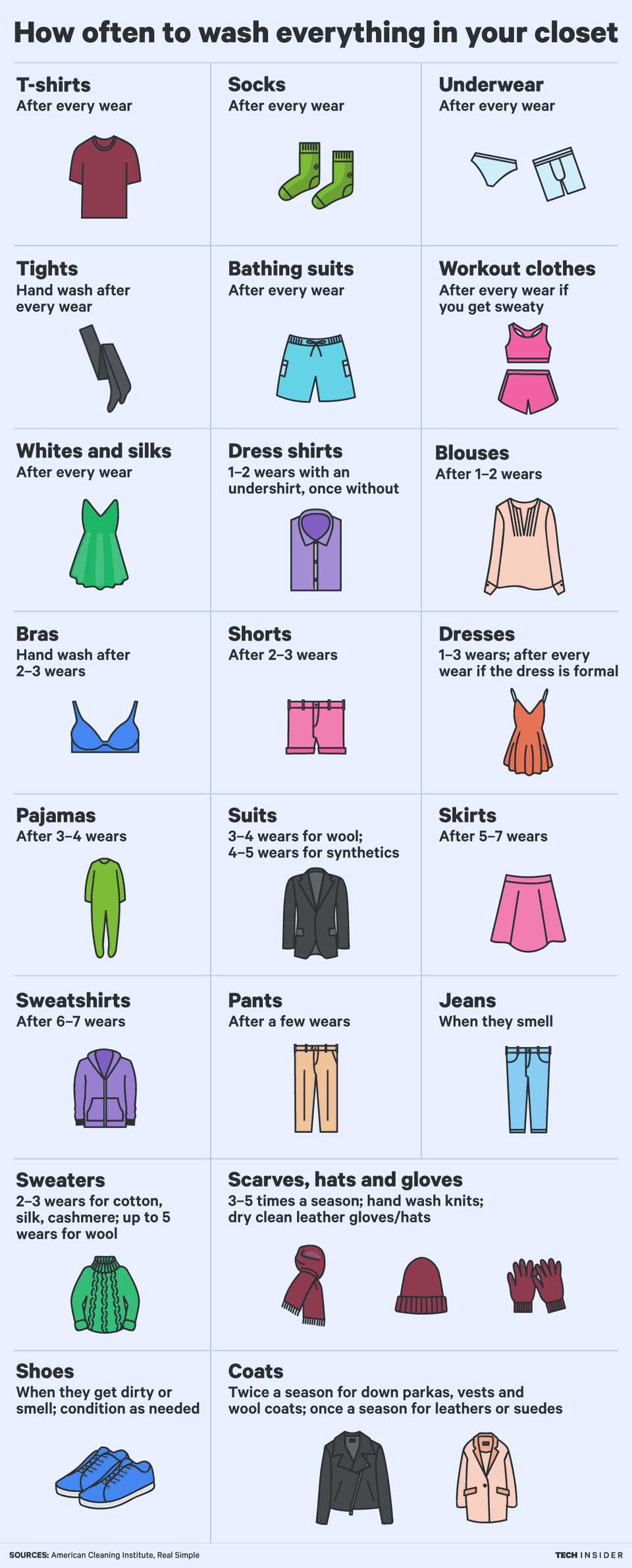
When determining how often to do laundry, there are several individual factors that can influence the frequency. These factors include:
- Personal Hygiene: Individuals who prioritize personal hygiene may prefer to do laundry more frequently. This is especially true for items such as underwear, socks, and gym clothes that come into close contact with the body.
- Climate: The climate in which a person lives can also impact laundry frequency. In hot and humid climates, individuals may sweat more and therefore need to wash their clothes more often.
- Lifestyle: Individuals with active lifestyles, such as athletes or those who regularly exercise, may need to do laundry more frequently to keep up with the constant accumulation of workout clothes and sports gear.
- Occupation: Certain occupations, such as those that involve physical labor or working with chemicals, may result in clothes getting dirtier faster. In these cases, more frequent laundry may be necessary.
- Family Size: The size of a person’s household can also impact laundry frequency. Larger families with more members will generate more laundry and may need to do it more frequently than individuals living alone.
It is important for each individual to consider these factors and determine a laundry frequency that suits their specific needs and circumstances. Finding a balance between cleanliness, convenience, and energy efficiency is key to managing laundry effectively.
Environmental Considerations and Laundry Frequency
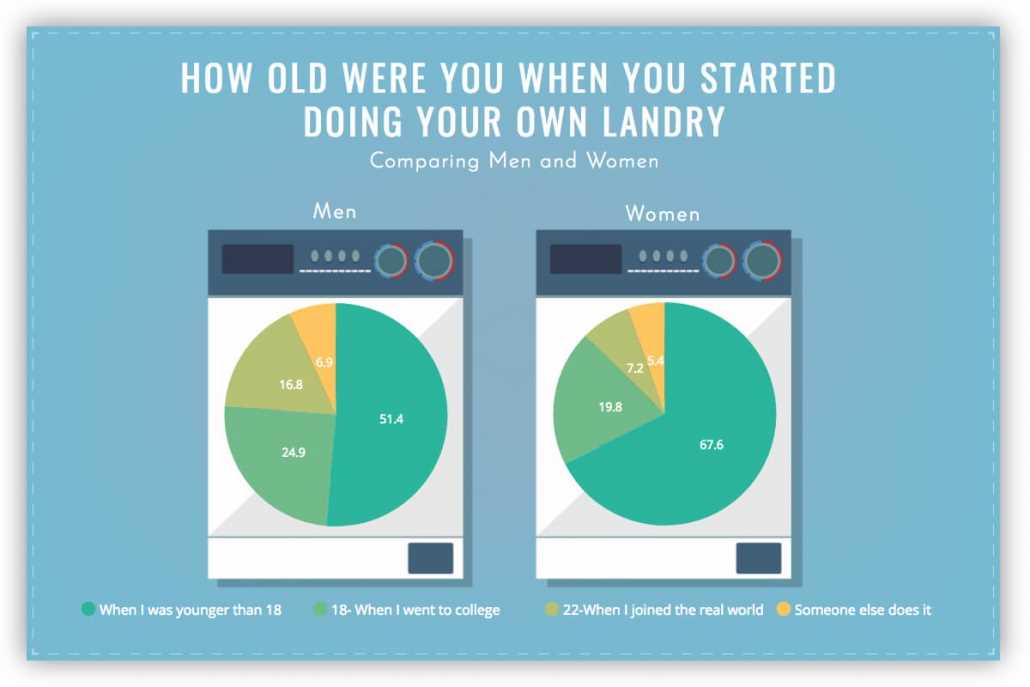
- Water Usage:
- Energy Consumption:
- Chemical Pollution:
- Wear and Tear on Clothing:
One of the main environmental considerations to keep in mind when deciding how often to do laundry is water usage. Washing machines consume a significant amount of water with each cycle. To reduce your water usage, it is recommended to wait until you have a full load of laundry.
Another important environmental factor to consider is energy consumption. Washing machines require electricity to operate, and the more frequently you use your machine, the more energy it consumes. To reduce your energy consumption, it is advisable to do laundry less frequently and opt for energy-efficient washing machines.
Laundry detergents and fabric softeners can contain harmful chemicals that can not only affect the environment but also pose health risks. By reducing the frequency of your laundry, you can minimize the amount of chemicals being released into the water supply.
Frequent washing can cause wear and tear on clothing, reducing its lifespan. If you wash your clothes less frequently, you can prolong their longevity and contribute to sustainable fashion practices.
In conclusion, there are several environmental considerations to keep in mind when deciding how often to do laundry. It is important to find a balance between maintaining cleanliness and minimizing your impact on the environment. Waiting until you have a full load of laundry, using energy-efficient machines, and reducing the use of harmful chemicals can all contribute to a more environmentally-friendly laundry routine.
The Impact of Clothing Usage on Laundry Frequency
When it comes to doing laundry, the frequency at which one person should do it largely depends on their clothing usage. Different factors can influence how often someone needs to do their laundry, including the number of garments they own, their lifestyle, and personal preferences.
1. Number of garments
The more clothes a person owns, the longer they can go without doing laundry. Someone with a larger wardrobe may be able to go a week or more between washes, while someone with a smaller wardrobe may need to do laundry every few days.
2. Lifestyle and activities
Individuals who lead active lifestyles or engage in activities that cause them to sweat heavily, such as exercise or outdoor work, may need to do laundry more frequently. Similarly, those who work in environments that involve exposure to dirt or stains may need to wash their clothes more often.
3. Personal preferences

Some individuals simply prefer to have freshly washed clothes and may choose to do laundry more frequently for personal comfort and hygiene reasons. Others may dislike doing laundry and, therefore, choose to wait until they have a larger load before washing.
4. Climate and weather
The climate and weather conditions can also impact laundry frequency. In hot and humid climates, individuals may sweat more and may need to wash their clothes more frequently. In cold climates, individuals may opt to wear layers and extend the time between washes.
5. Fabric care requirements
The type of fabric a person’s clothing is made of can also influence laundry frequency. Delicate fabrics may require special care and need to be washed more often, while sturdier materials may withstand multiple wears before needing a wash.
| Factors | Recommended Laundry Frequency |
|---|---|
| Large wardrobe | Once a week or longer |
| Active lifestyle or sweat-inducing activities | Every 1-2 days |
| Dirty or stain-prone environment | As often as needed |
| Personal preference for freshness | Every few days |
| Hot and humid climate | Every 1-2 days |
| Cold climate | Extended time between washes |
| Delicate fabrics | After each wear or as specified |
| Sturdy fabrics | Multiple wears before washing |
Ultimately, the frequency at which one person should do laundry is a personal choice based on their unique circumstances and preferences. By considering factors such as clothing usage, lifestyle, climate, and fabric care requirements, individuals can determine the laundry frequency that works best for them.
Expert Recommendations for Laundry Frequency
When deciding how often to do laundry, it is important to consider various factors such as personal hygiene, lifestyle, and the number of individuals in the household. Experts generally provide the following recommendations for laundry frequency:
Daily

- Undergarments: It is recommended to wash underwear and bras after each use to maintain good personal hygiene.
Every Few Days
- Socks: If you wear socks every day, it is best to wash them every few days to prevent build-up of bacteria and odors.
- Towels: Bath towels should be washed every 2-3 uses, while hand towels and washcloths can be used for a couple of days before washing.
- Workout Clothes: If you exercise regularly, it is advisable to wash workout clothes after each use due to sweat and potential bacteria accumulation.
Weekly
- Bed Sheets: Changing bed sheets once a week is generally recommended for optimal cleanliness and comfort.
- Clothing: Most everyday clothing, unless visibly soiled, can be worn multiple times before needing to be washed.
Every Few Weeks
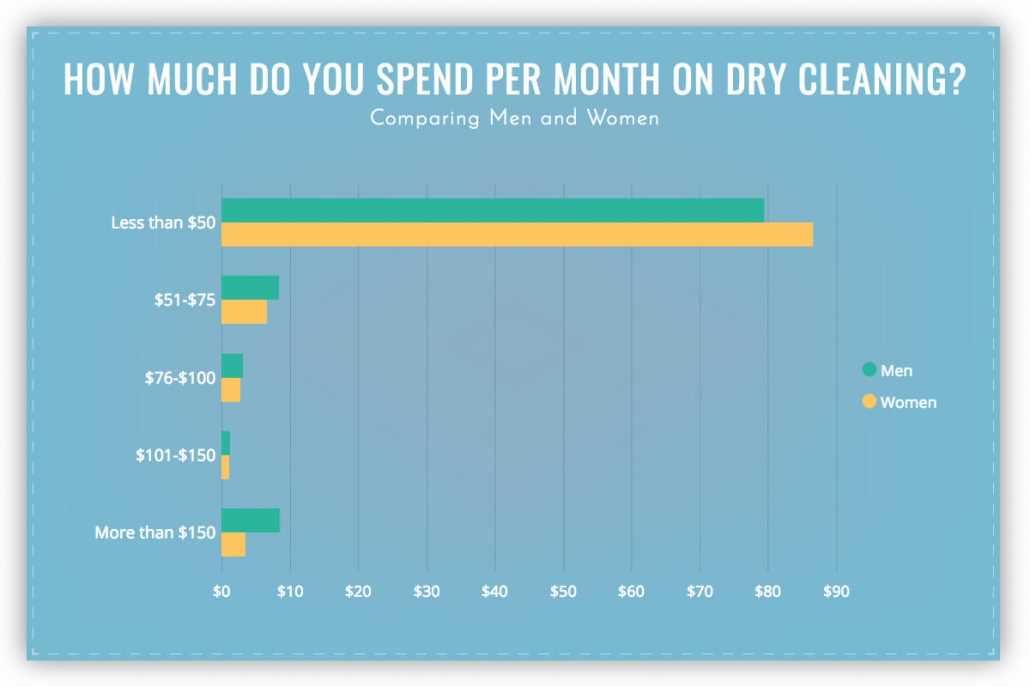
- Outerwear: Jackets, coats, and sweaters can often be worn a few times before washing, unless they have been soiled or exposed to strong odors.
- Pajamas: Pajamas can usually be worn for a few nights before needing to be washed.
Of course, individual circumstances may vary, and personal preferences should also be taken into account when deciding on laundry frequency. When in doubt, it is recommended to follow the care instructions on clothing labels and use common sense to maintain cleanliness and hygiene.
Tips for Efficient Laundry and Extended Clothing Lifespan
1. Sort your laundry
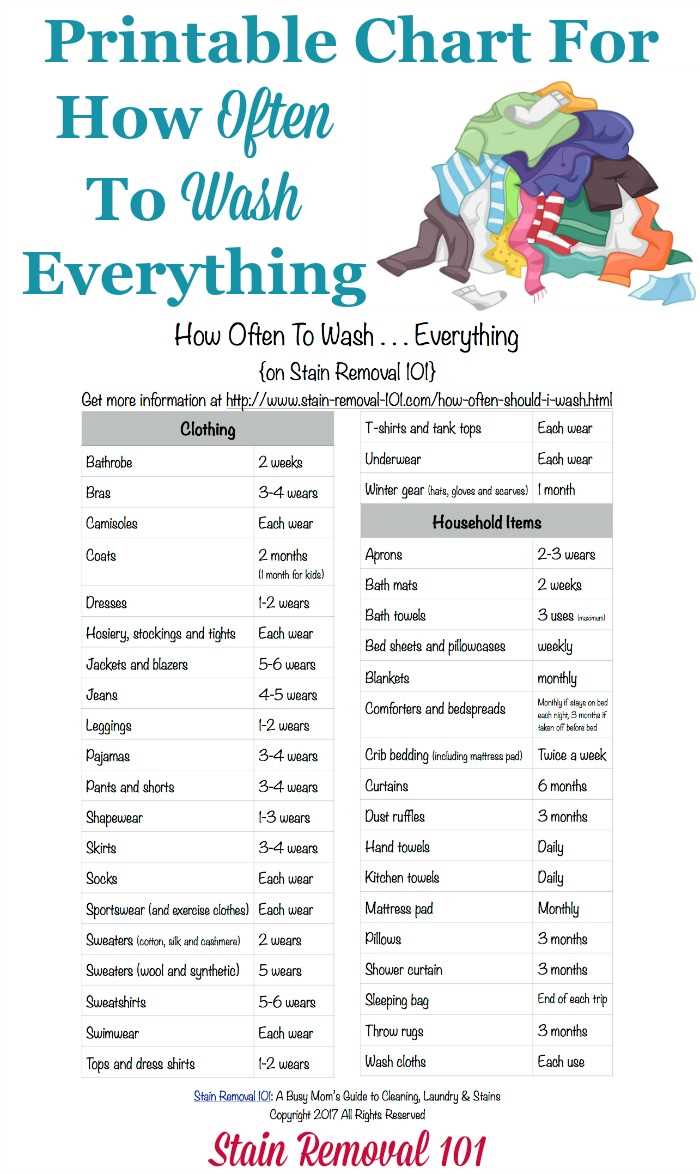
Sorting your laundry by color and fabric type will ensure that your clothes are washed properly and prevent any color bleeding or damage. Separate dark and light-colored clothing and wash delicate fabrics separately from more durable ones.
2. Pre-treat stains
To increase the chances of stain removal, it is important to pre-treat any stains before washing. Apply a stain remover directly to the stain and let it sit for a few minutes before laundering. This will help in maintaining the quality of your clothes and extend their lifespan.
3. Use the right amount of detergent
Using too much detergent can result in residue buildup and damage to your clothes. Read the instructions on the detergent packaging and use the recommended amount for your load size. This will also help in reducing the impact on the environment and save money in the long run.
4. Avoid overloading the washing machine
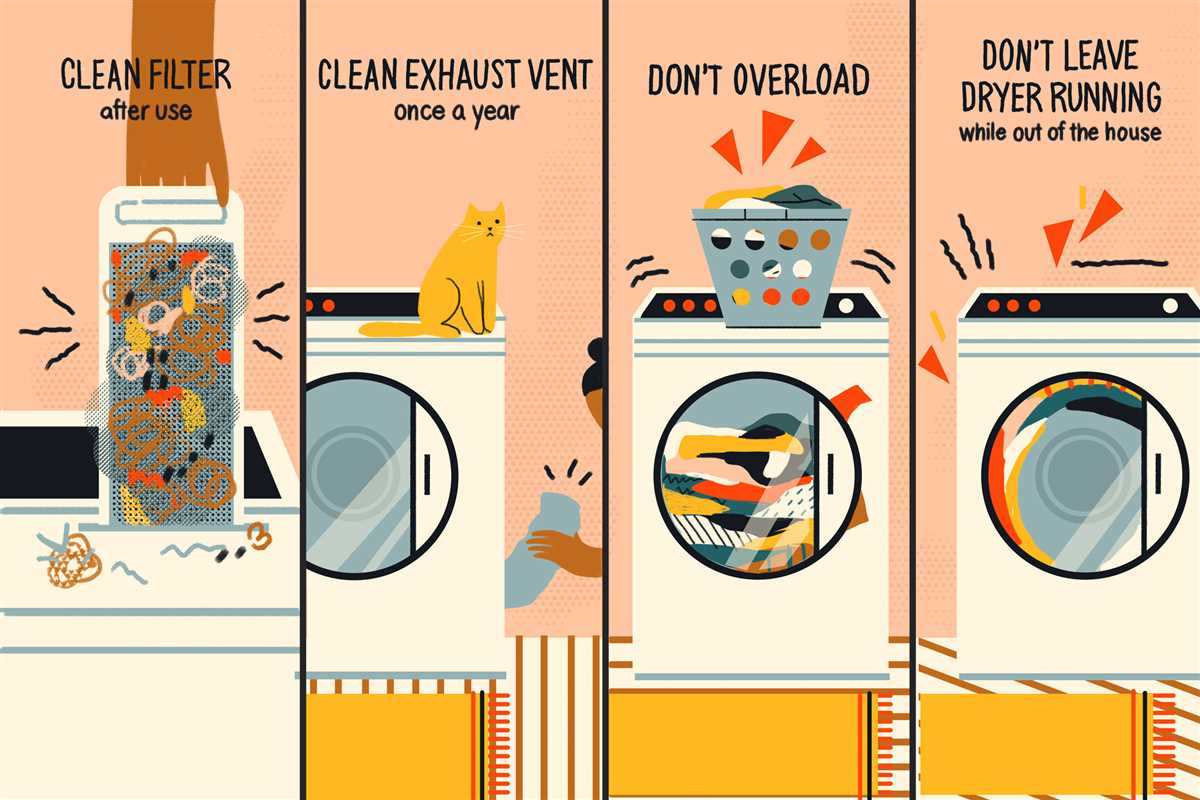
Overloading the washing machine can prevent clothes from getting properly cleaned and can cause unnecessary wear and tear on the fabrics. Follow the manufacturer’s guidelines for load capacity to ensure efficient cleaning and to prolong the lifespan of your clothing.
5. Hang-dry your clothes
Whenever possible, hang-dry your clothes instead of using a dryer. Air-drying helps in maintaining the shape and quality of the garment, reduces shrinking, and saves energy. Consider investing in a clothesline or drying rack as an eco-friendly drying option.
6. Properly fold or hang your clothes
Taking the time to fold or hang your clothes properly after they are dry can help in avoiding wrinkles and maintaining their shape. Delicate items should be folded and stored in drawers, while heavier items can be hung to prevent any stretching or distortion.
7. Follow care instructions
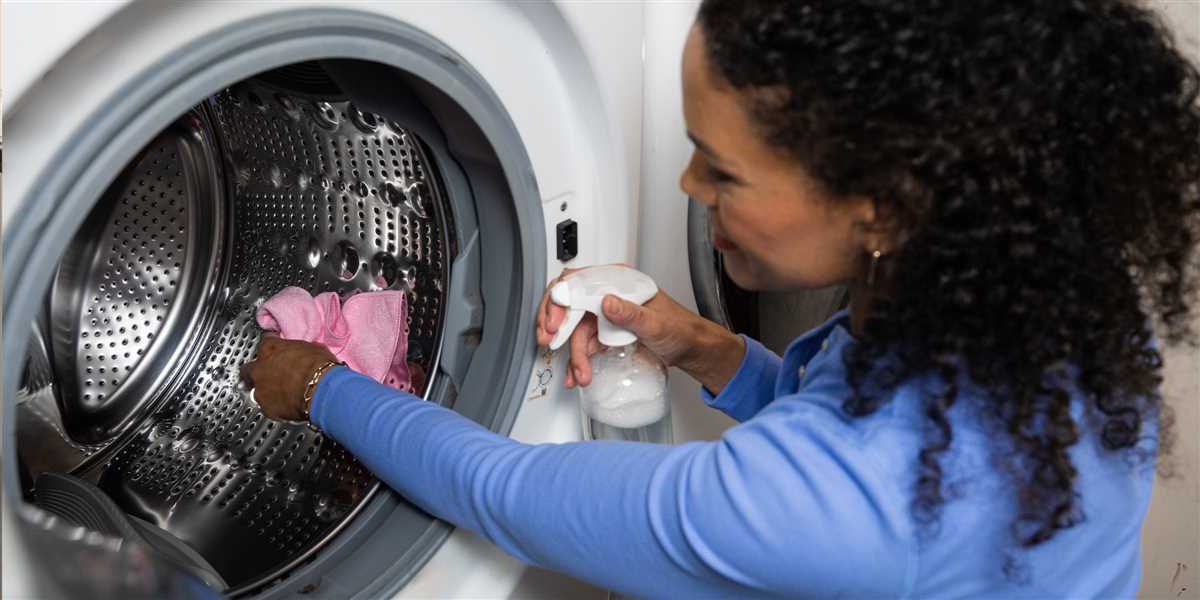
Always read and follow the care instructions on your clothing labels. Each garment may have specific requirements for washing, drying, and ironing. Adhering to these instructions will help in preserving the quality and longevity of your clothes.
8. Consider using fabric softener
Fabric softener can help in reducing static, making clothes smell fresh, and increasing softness. However, be sure to use it sparingly as excessive use can lead to buildup on the fabric and reduce absorbency.
9. Regularly clean your washing machine
To ensure your washing machine is working efficiently, it is important to clean it regularly. Run an empty cycle with hot water and vinegar or a washing machine cleaner to remove any buildup and prevent odors.
10. Donate or recycle unwanted clothes
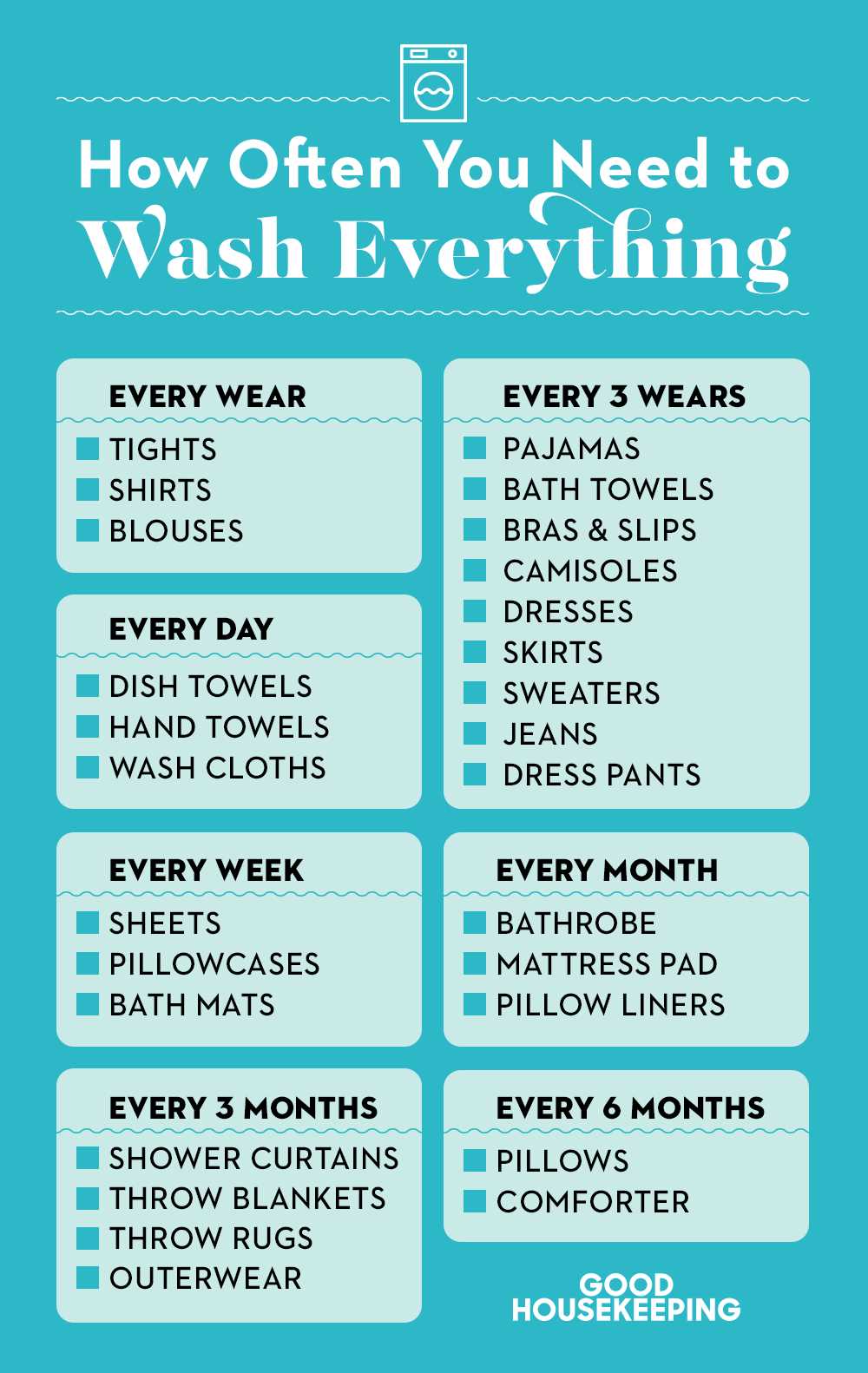
Instead of just throwing away unwanted clothes, consider donating them to local charities or recycling programs. This helps reduce textile waste and provides clothing to those in need. Clothes that are still in good condition can find new life with someone else.
By following these tips, you can optimize your laundry routines, ensure longer-lasting clothes, and make more sustainable choices when it comes to laundry care.
FAQ
How often should I do laundry if I live alone?
As a general rule, if you live alone, you should aim to do laundry once a week. This will ensure that you have enough clean clothes to wear throughout the week without having to run out of clean options. However, the frequency of doing laundry may vary depending on your lifestyle and personal preferences.
Is it okay to do laundry less frequently if I live alone?
If you live alone and have a small wardrobe or don’t generate too much dirty laundry, it is okay to do laundry less frequently. However, it is important to ensure that you have enough clean clothes to wear comfortably while maintaining good personal hygiene and avoiding unpleasant odors.
Can I do laundry every two weeks if I live alone?
If you live alone and have a minimal amount of dirty laundry, doing laundry every two weeks may be feasible. However, it is essential to assess the condition of your clothes and maintain good personal hygiene. Be mindful of any strong odors or stains that may accumulate if you go for longer periods without washing your clothes.
I live alone and sweat a lot. How often should I do laundry?
If you sweat a lot, it is recommended to do laundry more frequently. Aim to wash your clothes at least once every three to four days to prevent the buildup of bacteria, odors, and stains. Sweat can leave behind unpleasant smells and can impact personal hygiene if not addressed promptly.
What if I don’t have access to laundry facilities often?
If you don’t have regular access to laundry facilities, it is important to plan your laundry schedule accordingly. Consider hand washing essential items more frequently or find alternative laundry solutions like using a laundromat or asking friends or family if you can use their facilities. It may require some extra effort, but maintaining clean clothes is crucial for personal comfort and hygiene.
How often should I do laundry?
Experts recommend doing laundry once a week or every two weeks, depending on your lifestyle and preferences. If you have a large family or wear multiple outfits per day, you may need to do laundry more frequently. It’s important to wash your clothes regularly to maintain cleanliness and prevent odours.















